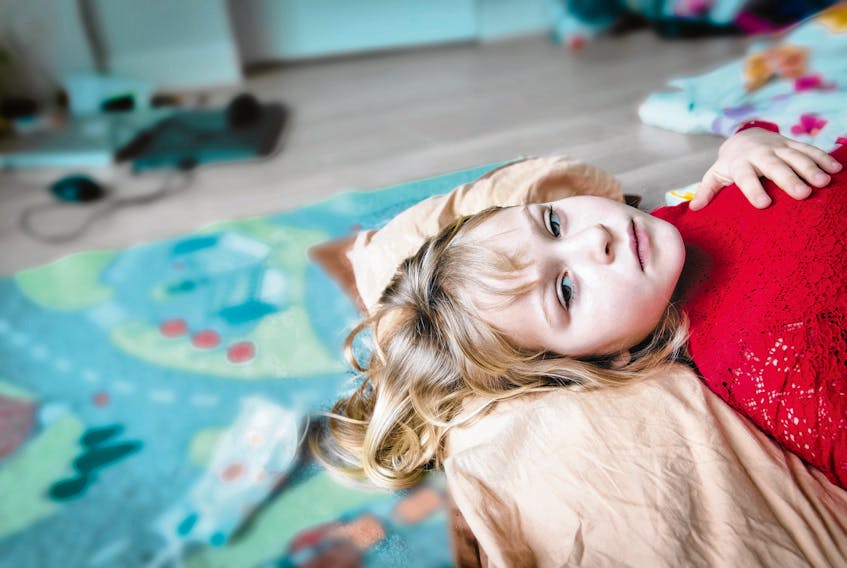My daughter is not doing good during these hard times. We’re confined in this small apartment and she misses playing with her school friends. I’m trying to keep reality from her but she’s listening to our conversations and lately, she’s started crying a lot, worried about her Nanny and Grampy. What should I do?
Jenny
Thanks for sharing this concern, you’re not alone as so many people are feeling the same way right now. It sounds like your daughter is experiencing some trauma from what’s happening in the world. Frankly I don’t blame her with the graphic photos of mass funerals and somber mortality predictions; it’s all pretty scary even for an adult.
But we can take solace in the cutting-edge work done by pioneers who are helping us understand trauma and ways we can protect ourselves from its lasting effects. First of all, let’s identify what trauma is and then consider ways of dealing with it effectively.
Trauma typically occurs when an intense, emotionally charged event happens, leaving the child disconnected from their body and unable to regulate their emotions. Feelings such as helplessness and overwhelm can prevent a child (or anyone) from using previously effective coping strategies for dealing with stress. This inability to cope can strip away their self-esteem, confidence and even negatively affect their long-term health.
What I find interesting about trauma, is that everyone deals with hardship in vastly different ways. For example, sometimes an event will occur within a family and one member may walk away with symptoms of trauma and another won’t be affected in the same way. This does not mean that the former member is weak, they just have a more sensitive constitution than the latter member. Other factors that make a child vulnerable to trauma are age (the younger the child, the more difficult it is for them to manage stress), relationship attachments (how strong the emotional bond is) and history (generational trauma tends to have a cumulative effect).
That to say, if you have very young children (five and under), it’s best to withhold the latest news updates and provide a very high-level report on what’s happening. Keep it light and avoid sharing gory details. For older children (six to 12), it’s wise to buffer their exposure as well, while informing them of the seriousness of the situation so they understand the reason for the strict behavioral measures. As for adolescents, well, unfortunately many teens have already witnessed hundreds of thousands simulated homicides, so they may be quite desensitized from it all. For these teens who watch a lot of on-screen violence, we can be teaching them compassion and how to be present to their peers in a supportive way. For others, like the more sensitive teens, we can be encouraging them to limit their consumption of negativity as their tender spirits require more protection.
Whatever her age, your daughter needs reassurance, lots of affection and harmony in the home. If a peaceful home life is not possible, there’s nothing more expansive and healing than the great outdoors. Regular bike rides, or walks around the block, with spontaneous encounters with neighbors will help boost her mood, regulate her emotions and discharge pent up nervous energy.
I send my love to her, to you and to your family.
Blair
It does sound like your daughter is being affected by chronic, or prolonged stress from this global crisis. Here is a four-step process for supporting your child through this time of uncertainty:
1. Sit with her and ask her what she’s feeling. This step invites her to become present to sensations in her body, which helps her to understand what she’s feeling and connect to the messages within her body. If she’s not used to naming her sensations, you may want to offer suggestions like, tingly, tight, dizzy, clammy, jittery etc. Creating a language for felt sensations will help her to become more accepting of both the comfortable and the uncomfortable sensations, which is critical for healing.
2. Listen to her response and acknowledge whatever answer she offers. By giving your daughter your full attention (with eye contact) and accepting her truth without criticism, she will feel seen and heard and cared for. Who doesn’t feel better after sharing burdens with a loved one?
3. Ask her what she needs to feel better (instead of giving her a quick fix solution). This step encourages her to connect to her needs and express them, which helps to empower and rebuild confidence. Last year we were first on the scene for a child who underwent a traumatic situation within her home. When Jenny picked her up, she asked her what she needed and the child said unequivocally, “I need cake.” I wonder what your daughter would say if you asked her what she needs the next time she tears up?
4. Finally, when children are frightened, they instinctively run toward a caring adult for support. If you really want to be a beacon of safety for your daughter and help her find calm amidst this storm, you have to first cultivate it within yourself, so start breathing.
Above all else, love continues to rank as one of the top interventions for a supporting a traumatized youngster, so don’t underestimate the impact of being a consistent loving presence in her life. With these strategies, I am confident that you will both get through this and look back on this time as one that deepened your love for one another.
Have a question for Jenny and Blair? Send inquiries to [email protected]









